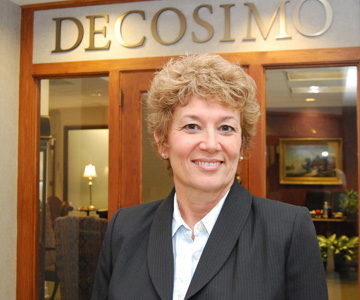Editorial
Front Page - Friday, October 9, 2009
Move over CSI; there’s a new kind of forensic investigator in town
dav

Maybe you own a business from which an employee is stealing money and you need help proving it. Perhaps something in your records looks suspicious and you want to clarify what’s going on. Or maybe you want to make sure your company’s accounting measures are airtight. Where can you go for help?
More and more businesses are turning to a new breed of accountants dubbed Certified Fraud Examiners, CPAs and the Association of Certified Fraud Examiners say show advanced proficiency in the area of financial fraud prevention and detection. One Chattanooga CFE is Sharon Hamrick, a CPA with accounting and business advisory firm Joseph Decosimo.
Hamrick, along with a team of forensic accountants at Decosimo, spends her days resolving allegations of fraud, providing fraud risk assessments, evaluating internal controls, helping design and implement anti-fraud programs (that include the use of computer-aided detection tools) and offering solutions that reduce the risk of fraudulent financial reporting and workplace fraud.
Although television executives don’t consider the work Hamrick and her colleagues do hip enough to warrant a prime time TV show (in other words, don’t look for CBS to air episodes of “CPA: Chattanooga” anytime soon), Decosimo and firms that offer similar services are helping businesses uncover criminal and potentially crippling behavior. This, in turn, safeguards the economy in which these companies operate.
For this reason, Hamrick says her work is tremendously gratifying. “If a business is providing employment to individuals and helping to support the economy, and if they’re losing revenue somehow, then that money is not being used productively,” she says. “Whether it’s a big corporation or a small local company, those people are investing their time, energy and intellect into their business, so we’re thrilled when we can put an end to someone else misusing those funds.”
It’s not news that fraud is a big problem in today’s economic climate. According to a 2008 report by the Association of Fraud Examiners, which looked at 1,000 cases across the U.S., businesses are losing approximately 7 percent of their earnings to fraud each year. And it’s not just money that’s lost but also the time spent chasing down and prosecuting offenders.
“We go into every investigation with the assumption that it’s going to end up in litigation,” says Hamrick. “We’ve worked cases in which we assisted the prosecution all the way through the criminal portion of the trial. People have been put behind bars as a result of our efforts.”
Although Hamrick can’t discuss specifics, the CFEs at Decosimo recently worked a case in which an employee of a check cashing business was pilfering revenue. During an investigation for a different company, the same team investigated a bookkeeper that was falsifying checks. In another case, a worker was skimming money from cash register transactions.
“Sometimes it’s a little bit of money. Employees occasionally test the waters to see if anyone will notice,” Hamrick says. “When no one does, it can become a pattern of behavior.”
Whatever the crime, Hamrick says the motivation stems from three things: the opportunity to steal, a perceived need and the ability to rationalize the behavior. “Normally, the perceived need is not a financial need,” says Hamrick. “The person might not feel appreciated or might feel jilted because he didn’t get promoted.”
Hamrick also says most offenders have never committed fraud before, but are often employees who have come to feel isolated within a company and are dealing with a financial need of some kind, whether it’s a health issue, a gambling problem or a desire to have things they otherwise couldn’t afford.
To help deter fraud, Hamrick tells clients to require every staff member in an accounting-related position to take an annual vacation and have someone else do their job while they’re gone. “If you have someone involved in an ongoing scheme, and no one does their job while they’re gone, their work will just wait for them,” she says.
Although Hamrick doesn’t take to the streets with a gun at her hip like the forensic investigators on “CSI,” her profession does have its risks. For one, she and her associates must treat electronic data like fine china.
“You have to make sure you don’t mishandle anything so there’s never a question about what you’ve done,” she says. “We have IT specialists who can mirror a person’s computer without making any changes to it and then apply sophisticated data analysis tools to the information.”
Even in the digital age, Hamrick says CFEs often find themselves elbow deep in old fashioned wood pulp, looking at invoices, checks, cash register tapes, time cards, payroll records, bank statements and more to find the tiny piece of thread that will make her go “Aha!”
“I enjoy pulling that string and seeing what unravels,” she says.
Hamrick has more than 20 years of experience providing business consultation, tax preparation and financial statement preparation services for the manufacturing, retail, health care and construction industries. Her experience includes consulting work in the taxation, accounting, financial, economic and business issues of commercial litigation, with an emphasis on economic damages and forensic accounting.
While Hamrick’s collective experience helped her to earn the CFE designation, she says her analytical mind is one of her most important assets.
“I have the ability to see patterns in behavior or documentation,” she says. “I believe I’m good at communicating with people and getting them to cooperate.”
Beyond that, Hamrick takes pleasure in putting all of the information she’s found into a simple, concise report that explains what she found in the fraud investigation, how she calculated the damages or what she discovered during a risk assessment analysis.
The producers at CBS might not be knocking on Hamrick’s door, but clients are, and as long as she can make a positive difference for them, she’s happy.
|
|